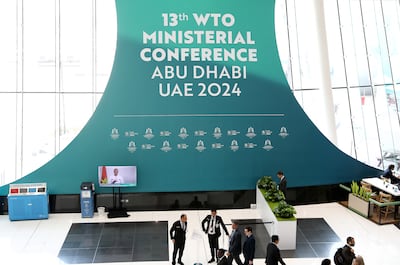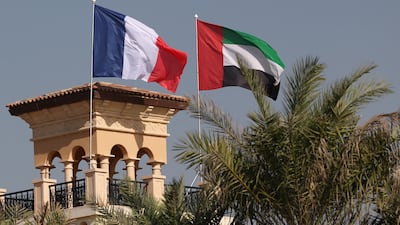Trade between the UAE and France reached €7 billion ($7.6 billion) last year and is expected to increase this year amid the deepening of investment and trade ties between the two countries, France’s Minister of Foreign Trade and Economic Attractiveness said on Tuesday.
The European economy aims to boost its partnership in sectors, including renewable energy, mobility, health, technology and artificial intelligence, Franck Riester told The National in an interview on the sidelines of the World Trade Organisation’s 13th ministerial conference in Abu Dhabi.
“Our two countries are linked by a very strong relationship … and that has already many results, real results and benefits,” said Mr Riester.
“It's €7 billion of trade exchange between our two countries and many investments … we have 600 subsidiaries of French companies here in the country, and we really want to go further to tackle issues of the future, together with the country, either in trade exchanges or in investments – investments in the country, from France and from the country to France.”
Last week, the UAE and France held a high-level business council meeting in Paris amid efforts to strengthen their trade and investment ties, according to a Wam report.
The meeting was co-chaired by Dr Sultan Al Jaber, Minister of Industry and Advanced Technology and managing director and group chief executive of Adnoc, and Patrick Pouyanne, chairman and chief executive of TotalEnergies, in the presence of France’s Finance and Economy Minister Bruno Le Maire.
The two sides also signed a preliminary agreement to establish the UAE-France Bilateral Climate Investment Platform, to help French and Emirati investors boost investments in clean energy projects, with a particular focus on advancing the decarbonisation of hard-to-abate industries.
The platform includes Adnoc and Masdar as the anchor parents from the UAE side and TotalEnergies, Bpifrance and CMA-CGM from the French side.
“We have decided to build an even stronger business relationship which gathers leaders, political leaders and business actors, companies and entrepreneurs,” Mr Riester said.
He said the idea was to enable investment by individuals or companies and said they had high hopes that the platform would help the two sides “create value together”.
The India-Middle East-Europe Economic Corridor which was announced during the G20 summit in New Delhi last year, would “mobilise all the way to increase trade and increase business in a fair way, in a respectful way”, according to Mr Riester.
“We think this corridor could be one of the ways to go further in this direction,” he said.
The corridor consists of several countries in the Middle East including the UAE, Saudi Arabia, Jordan and Israel, as well as European partners such as France, Italy and Germany, and India and the US.
The project will be made up of the east corridor connecting India to the Arabian Gulf and the northern corridor connecting the Arabian Gulf to Europe.

The cross-border transit corridors are expected to reduce shipping costs across the network and support trade in goods and services to, from and between the UAE, Saudi Arabia, India, and Europe.
France is committed to protecting maritime routes to support the growth of trade amid continued attacks by Houthi rebels on ships in the Red Sea, Mr Riester said.
“We are really committed in the European mission here in the Red Sea, to protect maritime transport routes. That is very key for trade in the region, specifically for the United Arab Emirates, but also for the rest of the world and specifically Europe,” he said.
He also expressed hope that the outcomes at the ministerial conference in Abu Dhabi will be at the same level as that of the previous ministerial conference in Geneva, where it was resolved to “reform the WTO specifically when it comes to the dispute settlement issue, to go further in the negotiations for fisheries”.
“We want to maintain a moratorium on e-commerce and it is very crucial, and we want to tackle different issues that are very important for the future, for instance, industrial policies,” Mr Riester said.


